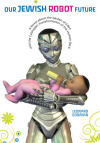Our Jewish Robot Future
Margarita and Alex Haralson are just average Jewish parents. Sixty-somethings, recently retired, they want nothing more than to get some grandchildren, and quick. But their two grown children refuse to cooperate (marijuana usage, potential lesbianism, and other obstacles get in the way of progeny production). So, Margarita and Alex do what, perhaps, any folks would do: they turn to robots. Or, to be more precise, the robots turn to them. Hey, whatever it takes to get some grandchildren!
Margarita and Alex Haralson are just average Jewish parents. Sixty-somethings, recently retired, they want nothing more than to get some grandchildren, and quick. But their two grown children refuse to cooperate (marijuana usage, potential lesbianism, and other obstacles get in the way of progeny production). So, Margarita and Alex do what, perhaps, any folks would do: they turn to robots. Or, to be more precise, the robots turn to them. Hey, whatever it takes to get some grandchildren!
Borman’s book is filled with humor and bizarre delightfulness. As the title itself suggests, Our Jewish Robot Future mixes two distinct worlds. On the one hand is the typically Jewish world occupied (at times) by Margarita, who, like any Jewish mother, relishes hearing about a potential mate for her son. As she listens to news about a friend’s daughter, Margarita “remembered Shirley, a good-looking girl, personable and intelligent. Finding out she was single was a godsend.” These words could come from any Jewish mother anywhere. Likewise the Yiddish that Borman sprinkles liberally throughout the novel, such as when Margarita threatens her son that she will “kick every gebuttska and give orders like Mussolini.” Odder, though, are the moments when the Jewish and robot worlds meld, giving rise to phrases like: “don’t let him fill your head with any of his cyborgian kvatsch.” The book sparkles with bits of quirkiness, such as the binary page numbers on the even-numbered pages (odd-numbered pages are rendered in standard Arabic numerals).
The novel is structured around Margarita talking to her newborn child. She and Alex follow a plot-line similar to the biblical Abraham and Sarah, having this late-life baby. As a result of the structure of Margarita speaking to the child, the entire plot of the novel is cast as back-story. Things get even trickier when there is back-story within the back-story. The end result is an unfortunate amount of rather plain telling as, for instance, happens when Margarita and Alex try to explain what has happened to their rabbi:
I calmed down and began again. Alex tried to speak but I told him to shut up. I am the storyteller. A robot named Jonathan Chapman cunningly kidnapped Alex and took him to the Garden of Eden on a distant planet. Meanwhile, at home a robot that looked just like Alex was a stand-in while my Alex was away. At first I didn’t notice anything different since my dear husband often goes through periods of having a somewhat metallic personality. One day, all was revealed when Robot Alex sat next to me on the couch and started crying like a baby, literally – he hadn’t been programmed to cry like an elderly Jewish American.
What an amazing this scene this would have been to experience! But compressed into a rather flat retelling, the richness of the narrative disappears. Unfortunately, too much of the novel is told in this manner.
Borman clearly enjoys playing with ideas of religion. As robots take Alex to the planet Airets, he experiences an engaging hybrid of evolutionary and biblical ideas: Neanderthals alongside the Garden of Eden. Indeed, at the heart of this novel, beyond the robots and the over-sexed elderly Jews trying to conceive a child, lies an engaging exploration of morality and Jewish law. On Airets, Alex examines some the underlying rules governing what is Kosher, coming to the realization that there are “godly and non-godly powers. The sense of touch was non-godly and had its own set of rules: no stealing, no murder. But what’s so horrible about eating?” What unfolds following this revelation is a unique reconsideration of Jewish dietary law.
Life on earth is confusing enough for the Haralsons – adding robots and visits to Airets makes the whole matter completely opaque. Our Jewish Robot Future rollicks with raucous scenes and is chock-full of crazy concepts. The ridiculous turns of plot, the absurd events cannot only be forgiven but enjoyed. Even the haphazard science (the robots are invented in the following manner: “He built a prototype.” End of description.) can be excused in light of the depth of other concerns. Harder to forgive is the relentlessly flat, overly declarative writing style: “After a few moments in silence, I said we were skirting the issue. The children must be told about the robots and the importance of them getting married and having children. Your father said I had a luncheon date with Roman, so broach the subject with him. I said I was afraid of how he’d react.” Nonetheless, Borman’s novel is one-of-a-kind, a daring combination of real and unreal, expressing a creative and unique vision of what is and what is to come.





